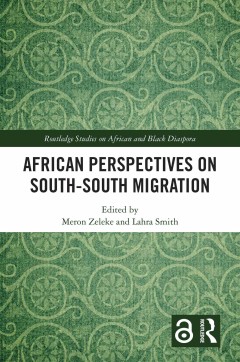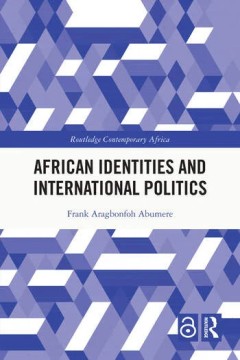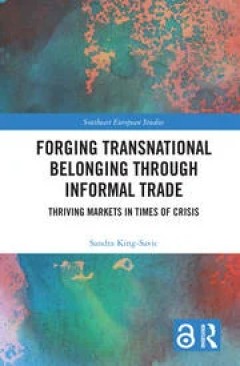Filter by

After Mosul. Re-Inventing Iraq
- Edition
- -
- ISBN/ISSN
- 9788867056347
- Collation
- -
- Series Title
- -
- Call Number
- -
- Edition
- -
- ISBN/ISSN
- 9788867056347
- Collation
- -
- Series Title
- -
- Call Number
- -

African perspectives on South-South migration
This book investigates the diverse and dynamic forms of migration within Africa. Centring themes of agency, resource flows, and transnational networks, the book examines the enduring appeal of the Global South as a place of origin, transit, and destination. Popular media, government pronouncements, and much of the global research discourse continue to be oriented towards migration from the G…
- Edition
- -
- ISBN/ISSN
- 9781003368267
- Collation
- -
- Series Title
- -
- Call Number
- -

African identities and international politics
Using the lenses of realism, liberalism, the English School and constructivism, this book explains how the divisions and differences in African identities affect African international politics. This book explores the African condition in the twenty-first century. It analyses how geographical, racial, ethnic, linguistic, religious and power differences shape continental and intercontinental rel…
- Edition
- -
- ISBN/ISSN
- 9781003176732
- Collation
- 176
- Series Title
- -
- Call Number
- -

Vaccine Hesitancy in the Nordic Countries Trust and Distrust During the COVI…
Bringing together studies from across the Nordic region, this book examines the challenges brought by the COVID-19 pandemic, with a particular focus on vaccine hesitancy. Shedding light on the political tensions that emerged as a result of the pandemic and the debates that ensued both within and between the Nordic nations, it investigates the vociferous discussions surrounding the COVID-19 vacc…
- Edition
- -
- ISBN/ISSN
- 9781003305859
- Collation
- -
- Series Title
- -
- Call Number
- -

Politics as a Science : A Prolegomenon
ABSTRACT In Politics as a Science, two of the world's leading authorities on Comparative Politics, Philippe C. Schmitter and Marc Blecher, provide a lively introduction to the concepts and framework to study and analyze politics. Written with dexterity, concision and clarity, this short text makes no claim to being scientific. It contains no disprovable hypotheses, no original collection of…
- Edition
- -
- ISBN/ISSN
- 9781003032144
- Collation
- -
- Series Title
- -
- Call Number
- -

Forging Transnational Belonging through Informal Trade : Thriving Markets in …
Analyzing informal trading practices and smuggling through the case study of Novi Pazar, this book explores how societies cope when governments no longer assume the responsibility for providing welfare to their citizens. How do economic transnational practices shape one’s sense of belonging in times of crisis/precarity? Specifically, how does the collapse of the Ottoman Empire – and the …
- Edition
- -
- ISBN/ISSN
- 9781003022381
- Collation
- -
- Series Title
- -
- Call Number
- -

Drylands Facing Change : Interventions, Investments and Identities
This edited volume examines the changes that arise from the entanglement of global interests and narratives with the local struggles that have always existed in the drylands of Africa, the Middle East, and Central Asia/Inner Asia. Changes in drylands are happening in an overwhelming manner. Climate change, growing political instability, and increasing enclosures of large expanses of often co…
- Edition
- -
- ISBN/ISSN
- 9781003174486
- Collation
- -
- Series Title
- -
- Call Number
- -
Nuclear disarmament and non-proliferation: towards a nuclear-weapon free world?
A PDF version of this book is available for free in open access via www.tandfebooks.com as well as the OAPEN Library platform, www.oapen.org. It has been made available under a Creative Commons Attribution-Non Commercial-No Derivatives 3.0 license and is part of the OAPEN-UK research project. This book examines the current debate on nuclear non-proliferation and disarmament, notably the intern…
- Edition
- 1st Edition
- ISBN/ISSN
- 9780203842591
- Collation
- -
- Series Title
- -
- Call Number
- -

Expertise, Policy-making and Democracy
ABSTRACT This book offers a concise and accessible introduction to debates about expertise, policy-making and democracy. It uniquely combines an overview of recent research on the policy role of experts with discussions in political philosophy and the philosophy of expertise. Starting with the fact that well-functioning democracies require experts and expert knowledge, the book examines two ty…
- Edition
- -
- ISBN/ISSN
- 9781003106555
- Collation
- -
- Series Title
- -
- Call Number
- -

Trust and Terror: Social Capital and the Use of Terrorism as a Tool of Resist…
Why do some individuals choose to protest political grievances via non-violent means, while others take up arms? What role does whom we trust play in how we collectively act? This book explores these questions by delving into the relationship between interpersonal trust and the nature of the political movements that individuals choose to join. Utilizing the examples of the Arab Spring uprising…
- Edition
- -
- ISBN/ISSN
- 9781315505817
- Collation
- -
- Series Title
- -
- Call Number
- -
 Computer Science, Information & General Works
Computer Science, Information & General Works  Philosophy & Psychology
Philosophy & Psychology  Religion
Religion  Social Sciences
Social Sciences  Language
Language  Pure Science
Pure Science  Applied Sciences
Applied Sciences  Art & Recreation
Art & Recreation  Literature
Literature  History & Geography
History & Geography